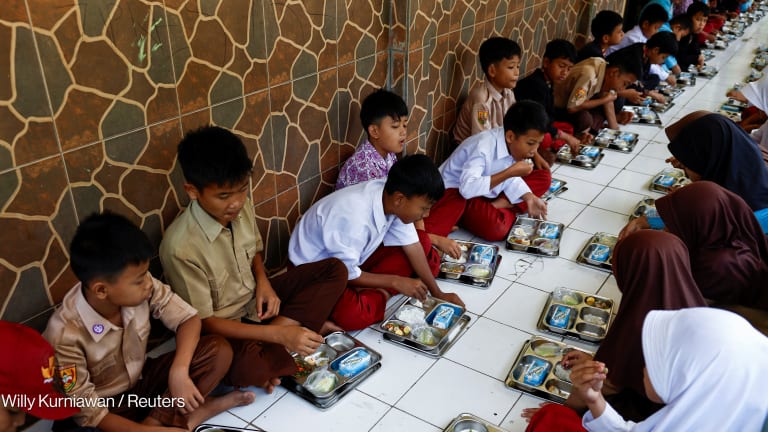“Don’t do what we have done” was one of the resounding messages Santiago Levy told an audience of development professionals, government representatives, civil society, private sector and members of academia during the Asian Development Bank’s Social Protection Week at the bank’s headquarters in Manila, Philippines.
Levy, vice president for sectors and knowledge at the Inter-American Development Bank and known for being the architect behind Mexico’s globally renowned social assistance program Oportunidades, renamed Prospera, was referring to the social insurance policies that a number of governments in Latin America implemented over the years. While the policies were adopted with good intentions — extending insurance coverage to the informal sector — they’ve produced unintended consequences that have only exacerbated the problem of informal work.
In Mexico, for example, a study in 2012 that Levy cited found formal employment fell between 8 percent and 20 percent from 2002 to 2010 when the government began subsidizing informal workers’ health insurance. Small and medium firms or companies, attracted to the potential of not paying for the health insurance of their own employees, started hiring illegal workers. In Argentina, informal workers felt incentivized to stay in their sector after the government extended child allowance benefits to laborers with children working outside the formal economy, a 2015 study found.
The results run counter to what governments had wanted to achieve: reduce informality in the job market to increase the government’s tax base. Taxes play a huge part in fueling countries’ social protection programs.
But with most governments struggling with weak tax systems, the question now shifts to where money will come from if governments, as Levy suggested, were to let go of wage-based revenues to fuel their social insurance programs.
The IDB official sat down with Devex to discuss how the bank is assisting countries in this regard, and where he thinks governments in the region should start focusing when developing their social protection programs. Here are the highlights of the conversation:
Are there any stop gap measures governments can use while still working on improving their tax systems to fuel their social protection programs?
There’s no magic wand. There are no quick solutions. Sure, if you have a very tight fiscal context, there are certain things you can do to improve the quality of programs. So with the same amount of resources, you can extend coverage or you can provide better services. But there’s a limit to how much you can do with that.
At the end of the day, if you want an effective social protection system that has broad coverage, you must have a revenue source that is effective and that can provide sustainable resources for that.
What you cannot have is a weak tax base, and an effective and broad coverage social protection system. That will not happen.
How is the Inter-American Development Bank, as a multilateral financing institution for the Latin America and Caribbean region, assisting governments in their social protection programs?
It is a very important component of the work that the bank does with countries. We do it through very many instruments. There’s a lot of lending for social protection programs. We have lending for [conditional cash transfers], we have lending for health programs, for education programs, for labor training programs, for pension reforms.
So there’s a lot of lending options that go on for social protection.
There are also a lot of knowledge products. We invest a lot in research. We also have grants. We have a lot of dialogue with countries. We have capacity building. So we’re broadly engaged in social policy in Latin America across the range of instruments that the bank put and we think is a very, very important component of what we do to help countries.

Do you have any specific focus?
No, it really depends on the need of countries. In some cases we’re working on early child development programs, in other cases we’re working on quality of education programs, in some other countries we’re working on pension reform.
It depends on what the country needs. We try to be useful and adapt to their needs.
Where are countries focusing on now in the Latin America and Caribbean region?
Latin America and the Caribbean is a very heterogeneous region. So you have very small countries such as Belize, you have very big countries such as Brazil, so there’s a very broad range of countries.
There’s also a lot of heterogeneity in terms of their demography and the way the labor market functions. So, it’s difficult to say that the broad trend in Latin America is one in particular, because countries are very different and we help them in different ways.
That said, we’re very concerned about social insurance, because we think that the way social insurance programs are structured — in this divide between contributory and noncontributory programs — is really doing a lot of damage to the region.
And so we’re trying to work with governments in finding ways to ameliorate that problem.
Could there be areas you think could benefit from more government attention?
I think there would be a lot of gain if governments paid more attention to early child development. Latin America started with conditional cash transfer programs about 20 years ago. By and large they have been a success, and by and large poverty reduction has advanced as a result of these programs.
But now we know that these programs have to be complemented with more investments in early childhood. We also know that the quality of these programs matter a lot, and the interventions that are out there in the governments are either very small or the quality’s not sufficiently good.
So an area of work is trying to improve early childhood development programs.
Another area of work is to try to improve the quality of programs. In education for instance, there’s been a huge advance in terms of coverage. By now, people with primary education or even secondary education, the coverage rates are very, very high now in Latin America. The real challenge now is quality. So there’s a lot of work on trying to improve now the quality of coverage.
In pension there’s also a major problem because the fiscal challenge associated with pension is very, very large. And we’re working with governments in trying to find a way in redesigning the pension systems.
Devex is the exclusive media partner of the Asian Development Bank’s Asia-Pacific Social Protection Week.
Read more international development news online, and subscribe to The Development Newswire to receive the latest from the world’s leading donors and decision-makers — emailed to you FREE every business day.








